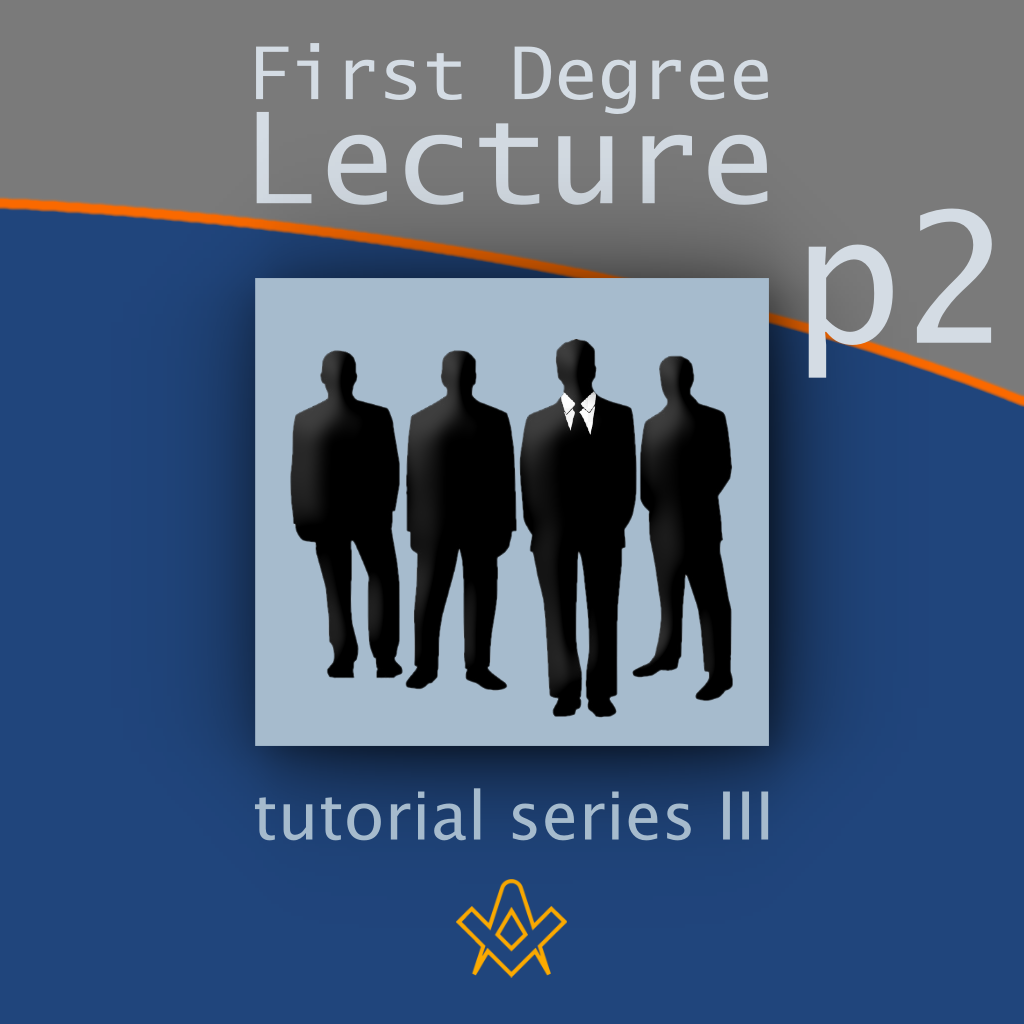The First Degree Lecture, Section two, by William Preston.
Video Presentation
Continuing with our Masonic education, I once again refer to the catechism written by William Preston on the First Degree Lecture. This section deals with the making of a Mason.
Again I have added some notes which I hope will assist you in understanding this section of the First Degree.
Q. Where were you first prepared to be made a Mason?
A. In my Heart.
(NOTE: It is in your heart that the emotions of who you are as a man and your aspirations of who you would like to be are concealed.)
Q. Where next?
A. In a convenient room adjoining the Lodge.
(NOTE: This is interesting as in some Lodges there is a ‘room of reflection’ in which the candidate is put prior to the ceremony. In this room the candidate is asked to reflect on his life and the reason he wishes to be a Freemason and write down his answers to certain questions. In other Lodges it is merely an ante room where the candidate is physically prepared.)
Q. Who brought you to be a Mason?
A. A friend, whom I afterwards found to be a Brother.
(NOTE: As a Mason, how would you describe someone as a ‘friend’? What do we really know about those we associate with? This can be tricky. I would look at what the opposite of friend is. Is he a foe? Is he someone who would do you harm given the opportunity?
I would then look at the wording of the ‘charge after initiation’ as a guide.
Is he someone who would fulfil all the elements mentioned in that charge. If that is answered in the affirmative then they are on their way to fulfilling the criteria of a ‘friend’ and becoming a Freemason.)
Q. Describe the mode of your preparation.
A. I was divested of metals and hoodwinked, my right arm, left breast and knee were made bare, my right heel was slipshod, and a cable tow placed about my neck.
Q. Why were you divested of metals?
A. That I might bring nothing offensive or defensive into the Lodge to disturb its harmony.
Q. A second reason?
A. As I was received into Masonry in a state of poverty, it was to remind me to relieve indigent brethren, knowing them to be worthy, without detriment to myself or connections.
Q. A third reason?
(NOTE: Alluding to the Mark Degree.)
A. At the building of King Solomon’s Temple, there was not heard the sound of metallic tool.
Q. How could the building of so stately an edifice as King Solomon’s Temple have been carried on and completed without the aid of metal tools?
A. The stones were hewn in the quarry, there squared, carved, marked, and numbered also; they were then floated to Joppa, thence conveyed on carriages to Jerusalem, and there set up with wooden mauls and implements prepared for that purpose.
Q. Why were the stones and timbers prepared so far off?
A. To show the excellence of the Craft in those days, for although the materials were prepared at so great a distance, yet when they were brought to Jerusalem, and came to be put together, each piece fitted to the exact nicety, that it appeared more like the work of the Great Architect of the Universe than of human hands.
(NOTE: All your choices and experiences in life come together to form who you are as a man of integrity, a man of faith, a Freemason.)
Q. Why were you hoodwinked?
A. That in case I had refused to go through any of the usual ceremonies required in making a Mason, I might have been led out without discovering its form.
Q. A second reason?
A. As I was received into Masonry in a state of darkness, it was to remind me to keep all the world so, with respect to our Masonic mysteries, unless they came legally by them as I was then about to do.
Q. A third reason?
A. That my heart might conceive before my eyes should discover.
(NOTE: By being in a state of darkness each of the candidate’s senses are heightened. He has to have trust and faith in his conductor to keep him safe from harm. He absorbs the solemnity of the occasion. This is a really big step.)
Q. Why were you slipshod?
A. Our Lodges being considered to stand on Holy Ground, it alludes to a certain passage of Scripture, where the Lord spake thus to Moses from the Burning Bush, “put off thy shoes from off thy feet, for the place whereon thou standest is Holy Ground.”
Q. Being thus properly prepared, where were you conducted?
A. To the Door of the Lodge.
Q. How did find that Door?
A. Shut and closed Tyled.
Q. Whom was it Tyled by?
A. One whom I afterwards found to be the Tyler of the Lodge.
Q. His duty?
A. Being armed with a drawn sword to keep off all intruders and cowans to Masonry, and to see that the candidates are properly prepared.
(NOTE: Allow none to enter your sphere of close friendship except those who are of good report and virtuous behaviour.)
Q. Being in a state of darkness, how did you know it to be a Door?
A. By meeting with an obstruction, and afterwards gaining admission.
Q. How did you gain admission?
A. By three distinct knocks.
Q. To what do these three distinct knocks allude?
A. An ancient and venerable exhortation. Seek, and ye shall find; ask, and ye shall have; knock, and it shall be opened unto you.
Q. How did you apply that exhortation to your situation?
A. Having sought in my mind, I asked of my friend, he knocked, and the door of Freemasonry became open unto me.
(NOTE: The door opened for you because you went through a series of examinations to ensure that you were a man of good report. If you were not so that door would have remained closed.)
Q. When the Masonic Door became open unto you, who came to your assistance?
A. One of whom I afterwards found to be the Inner Guard.
Q. What did he demand of your friend, or the Tyler.
A. Who he had there.
Q. The Tyler’s answer?
A. Mr. A. B., a poor candidate in the state of darkness, who has been well and worthily recommended, regularly proposed and approved in open Lodge and now come of his own free will and accord, properly prepared, humbly soliciting to be admitted to the mysteries and privileges of Freemasonry.
(NOTE: Here we have a man who knows very little about Freemasonry and is therefore in a state of darkness. Only when he is in the East after taking the obligation of a Mason is he restored to ‘Light’ and been given an insight to our Order.
He has been recommended by a ‘friend’ and undergone an interview process which has established that he is a man of integrity and of faith, and as such his name has been put to the Brethren of the Lodge for consideration and voted upon. Having gone through that process he now presents himself to the Lodge of his own free will.
He is then prepared by the Tyler for initiation and in a humble manner has asked to be admitted into our Institution. In a humble manner because no man can buy or force themselves into the Order. It can only be gained by the ‘tongue of good report’.)
Q. What did the Inner Guard further demand?
A. How I hoped to obtain those privileges?
Q. Your answer?
A. By the help of God, being free, and of good report.
Q. How did the Inner Guard then proceed?
A. He desired me to halt, while he reported to the Worshipful Master, who was afterwards pleased to order my admission.
Q. Were you admitted? And on what?
A. I was, on the Point of a sharp implement presented to my naked left breast.
Q. Why was the Point of a Sharp Implement presented to your naked left breast on your entrance to the Lodge?
A. To intimate to me that I was about to engage in something serious and solemn, likewise to distinguish the sex.
Q. When admitted into the Lodge, what was the first question put to you by the Master?
A. Mr. A. B., as no person can be made a Mason unless he is free and of mature age, I demand of you, are you a free man, and of the full age of twenty-one years? To which I answered in the affirmative.
(NOTE: A free man meaning he is an honourable man, free to make his own decisions, not a criminal. Of mature age: meaning he has gone through his adolescence and is now mature in his outlook on life.)
Q. What were you then desired to do?
A. Kneel and receive the benefit of Masonic prayer.
Q. Which I will thank you for.
A. Vouchsafe Thine aid, Almighty Father and Supreme Governor of the Universe, to our present convention, and grant that this candidate for Freemasonry may so dedicate and devote his life to Thy service, as to become a true and faithful Brother amongst us. Endue him with a competency of Thy Divine wisdom, that, assisted by the secrets of our Masonic art he may the better be enabled to unfold the beauties of true godliness, to the honour and glory of Thy holy name.
So mote it be.
Q. After the recital of this prayer what was the next question put to you by the Master?
A. In all cases of difficulty and danger in whom do you put your trust?
Q. Your answer?
A. In God.
Q. The Master’s reply?
A. Right glad am I to find your faith well founded; relying on such sure support, you may safely rise and follow your leader with a firm but humble confidence, for where the name of God is invoked we trust no danger can ensue.
(NOTE: Establishing before the Lodge members that the candidate is a man of Faith.)
Q. How did the Master then address the Lodge?
A. The brethren from the North, East, South and West will take notice that Mr. A. B. is about to pass in view before them to show that he is the candidate, properly prepared, and a fit and proper person to be made a Mason.
Q. How did your leader then dispose of you?
A. I, being neither naked nor clothed, barefoot nor shod, but in a humble, halting posture, he friendly took me by the right hand, led me up the North, past the West to the East, down the South, and delivered me to the Senior Warden in the West.
Q. What was required of you during your progress round the Lodge?
A. To go through an examination by the Junior Warden and Senior Warden similar to that I had done at the door of the Lodge.
Q. Why were you led round in this suspicious manner?
A. It was figuratively to represent the seeming state of poverty and distress in which I was received into Masonry, on the miseries of which (if realised) were I for a moment to reflect, it could not fail to make that impression on my mind, as to cause me never to shut my ears unkindly to the cries of the distressed, particularly a Brother Mason, but listening with attention to their complaints, pity would flow from my breast, accompanied with that relief their necessities required and my ability could afford. It was likewise to show that I was the candidate properly prepared and a fit and proper person to be made a Mason.
(NOTE: Read this answer several times in order for you to reflect upon it.)
Q. Who are fit and proper persons to be made Masons?
A. Just, upright, and free men, of mature age, sound judgement, and strict morals.
Q. Why are the privileges of Masonry restricted to free men?
A. That the vicious habits of slavery might not contaminate the true principles of freedom on which the Order is founded.
(NOTE: What are the ‘vicious habits of slavery’?
‘It is in allusion to that grand festival which Abraham made at the weaning of his son Isaac, when Sarah, Abraham’s wife, observing Ishmael, the son of Hagar the Egyptian bondwoman, teasing and perplexing her son, remonstrated with her husband, and said: Put away that bondwoman and her son, for such as he shall not inherit with the freeborn, even with my son Isaac.’
Meaning: Masons should be cautious with whom they mix, not by social standing but by virtuous behaviour.)
Q. Why of mature age?
A. The better to be able to judge ourselves, as well as the Fraternity at large.
Q. Why of sound judgement and strict morals?
A. That both by precept and example we may the better be enabled to enforce due obedience to those excellent laws and tenets laid down in Freemasonry.
Q. When delivered over to the Senior Warden in the West, how did he proceed?
A. He presented me to the Worshipful Master, a candidate properly prepared to be made a Mason.
Q. The Master’s answer?
A. Bro. Senior Warden, your presentation shall be attended to, for which purpose I shall ask a few questions to the candidate, which I trust he will answer with candour.
Q. The first of those questions?
A. Do you seriously declare on your honour, that, unbiased by the improper solicitation of friends against your own inclination, and uninfluenced by mercenary or other unworthy motive, you freely and voluntarily offer yourself a candidate for the mysteries and privileges of Freemasonry?
(NOTE: This is an affirmation of what was said on the candidates entrance to the Lodge; ‘He comes of his own free will and accord’.
Q. The second?
A. Do you likewise pledge yourself that you are prompted to solicit those privileges by a favourable opinion preconceived of the Institution, a general desire of knowledge, and a sincere wish to make yourself more extensively serviceable to your fellow creatures?
(NOTE: This question seeks to find out the reason for his application to be a Freemason)
Q. The third?
A. Do you further seriously declare on your honour, that, avoiding fear on the one hand and rashness on the other, you will steadily persevere through the ceremony of your initiation, and if once admitted, will afterwards act and abide by the ancient usages and established customs of the Order?
(NOTE: This question is important as it asks for an act of ‘blind faith’. The candidate does not know what the ‘antient usages’ and ‘established customs’ are. It is an act of trust in his friends and his friendship.)
To all of which, answers in the affirmative were given.
Q. What did the Master then order?
A. The Senior Warden to direct the Junior Deacon to instruct me to advance to the pedestal in due form.
Q. I will thank you to show the method of advancing from West to East in this degree.
A. (This done.)
Q. Of what do those three irregular steps consist?
A. Right lines and angles.
Q. What do they morally teach?
A. Upright lives and well squared actions.
(NOTE: An indication that the candidate is a just and upright man.)
Q. When placed before the Master in the East, how did he address you?
A. It is my duty to inform you that Masonry is free, and requires a perfect freedom of inclination in every candidate for its mysteries; it is founded on the purest principles of piety and virtue; it possesses great and invaluable privileges; and in order to secure those privileges to worthy men, and we trust to worthy men alone, vows of fidelity are required; but let me assure you that in those vows there is nothing incompatible with your civil, moral, or religious duties; are you therefore willing to take a solemn obligation, founded on the principles I have stated, to keep inviolate the secrets and mysteries of the Order? To which I gave my assent.
(NOTE: I recommend that you read this duty performed by the Worshipful Master several times in order that you may understand the seriousness of the Obligation. Fidelity means: ‘loyalty to a person or organisation’)
Q. Were you made a Mason?
A. I was, and that in due form.
Q. Describe the due form in which you were made a Mason?
A. I knelt on my left knee with my feet in the form of a square. With my right hand on the Volume of the Sacred Law, while my left was employed in supporting a pair of compasses presented to my naked left breast.
Q. Why were the Compasses presented to your naked left breast at the time of your initiation?
A. As the Compasses were then an emblem of torture to my body, so should the recollection ever prove to my mind, should I, at any future period be about to improperly disclose any of those Masonic secrets I was then on the point of being entrusted with.
Q. In that attitude what were you about to do?
A. Take the Great and Solemn Obligation of a Mason.
Q. Which I will thank you for.
A. I, A. B., in the presence of the Great Architect of the Universe, and of this worthy, worshipful, and warranted Lodge of Free and Accepted Masons, regularly assembled and properly dedicated, of my own free will and accord, do hereby and hereon sincerely and solemnly promise and swear, I will always hele, conceal, and never reveal any part or parts, point or points, of the secrets or mysteries of or belonging to Free and Accepted Masons in Masonry, which may heretofore have been known by me or shall now or at any future period be communicated to me, unless it be to a trusted and lawful Brother, or Brothers, and not even to him or them until after due trial, strict examination, or sure information from a well-known Brother that he or they are worthy of that confidence, or in the body of a just, perfect, and regular Lodge of ancient Freemasons.
(NOTE: As a Mason you promise that you will not share the sign, token or word of a Mason to anyone who is not a Mason. This is a continual test of your integrity throughout your life.)
I further solemnly promise that I will not write those secrets, indite, carve, mark, engrave, or otherwise them delineate, or cause or suffer it to be done by others, if in my power to prevent it, on anything movable or immovable under the canopy of Heaven, whereby or whereon any letter, character, or figure, or the least trace of a letter, character, or figure, may become legible, or intelligible to myself or any one in the world, so that our secret arts and hidden mysteries may improperly become known through my unworthiness.
These several points I solemnly swear to observe, without evasion, equivocation, or mental reservation of any kind, under no less a penalty, on the violation of any of them, than that of having my throat cut across, my tongue torn from its root and my body buried in the rough sands of the sea whence the tide doth wash twice in the course of a natural day
(NOTE: A symbolic penalty which in the 17th and 18th centuries was a lawful punishment of the time. It makes the candidate aware of the seriousness of the obligation.)
or the more effective punishment of being branded as a wilfully perjured individual, void of all moral worth, and totally unfit to be received into this worshipful Lodge, or any other warranted Lodge, or society of men who prize honour and virtue above the external advantages of rank and fortune.
So help me God, and keep me steadfast in this my Great and Solemn Obligation of an Entered Apprentice Freemason.
(NOTE: An obligation made before your God. The highest authority to a man of Faith.)
Q. Having taken the Solemn Obligation of a Mason how did the Master address you?
A. What you have repeated may be considered but a serious promise; as a pledge of your fidelity and to render it a Solemn Obligation you will seal it with your lips on the Volume of the Sacred Law.
Q. How did he further address you?
A. Having been kept for a considerable time in a state of darkness, what in your present situation is the predominant wish of you heart?
Q. Your answer?
A. Light. To which the Junior Deacon, by the Worshipful Master’s command was pleased to restore me.
(Note: It is at this point that you have figuratively passed from darkness in the West and into the Light in the East and the commitment of trying to be the best man you can be with the aid of Freemasonry.)
Q. Having been restored to the blessings of material light, what were then pointed out to you?
A. The three great though emblematical lights in Freemasonry, which are, the Volume of the Sacred Law, the Square and Compasses.
Q. There use?
A. The Sacred Words are to govern our faith; the Square to regulate our actions; and the Compasses to keep us in due bounds with all mankind, particularly our Brethren in Freemasonry.
Q. How did the Master then proceed?
A. He friendly took me by the right hand and said, “Rise, newly Obligated Brother among Masons.
Brethren, this ends the second section of the first lecture.
The heart that conceals and the tongue that never reveals, any or either of the secrets or mysteries of or belonging to Free and Accepted Masons in Masonry.
And so the candidate has been made a Freemason before everyone in the Lodge. He can now be considered a ‘Brother’. This is where his learning begins.
His journey to be the best man he can be with the help of those ‘Three Great Emblematical Lights’ which will be explained in the Section 3.
Article by: Stephen J. Goulding
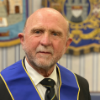
Stephen was initiated into Freemasonry in 1978 in Tylney Lodge No. 5856 (UGLE). He was Master in 1989 & 2004.
He was Master of the Lodge of Union 38 (UGLE) in 2018. He is also a PZ in the Holy Royal Arch and PM in the Mark Degree.
Stephen served 30 years in the Metropolitan Police Service (London, England) before going into education in 2000, where he became a college lecturer and a mentor for both the college and the University of Greenwich (London, England). Now retired, he teaches Tai Chi and Qigong in the community.
Facebook: Steve Goulding-Tai Chi West Sussex–Chi at Chi
Recent Articles: in this tutorial series
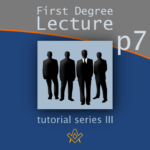 William Preston (1742 – 1818) gives his lectures in the form of a Catechism – questions and answers - and broken down into seven bite size chunks. This article is the first of the seven part series presented by Steve Goulding |
 William Preston (1742 – 1818) gives his lectures in the form of a Catechism – questions and answers - and broken down into seven bite size chunks. This article is the first of the seven part series presented by Steve Goulding |
 William Preston (1742 – 1818) gives his lectures in the form of a Catechism – questions and answers - and broken down into seven bite size chunks. This article is the first of the seven part series presented by Steve Goulding |
 William Preston (1742 – 1818) gives his lectures in the form of a Catechism – questions and answers - and broken down into seven bite size chunks. This article is the first of the seven part series presented by Steve Goulding |
 William Preston (1742 – 1818) gives his lectures in the form of a Catechism – questions and answers - and broken down into seven bite size chunks. This article is the first of the seven part series presented by Steve Goulding |
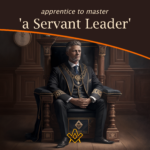 Apprentice to Master, “a Servant Leader”. Freemasonry is a learning platform used to improve a lifestyle which is morally, educationally and spiritually sound. To guide a person through life in order to be the best they can be. A Master, or ‘Servant Leader,’ develops those people in their care. They are someone who can guide others using the principles of Freemasonry - By Stephen J. Goulding |
 William Preston (1742 – 1818) gives his lectures in the form of a Catechism – questions and answers - and broken down into seven bite size chunks. This article is the second of the seven part series presented by Steve Goulding |
 William Preston (1742 – 1818) gives his lectures in the form of a Catechism – questions and answers - and broken down into seven bite size chunks. This article is the first of the seven part series presented by Steve Goulding |
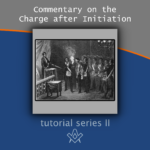 Commentary on the Third Degree Charge The Third Degree Charge invites the candidate to reflect on his life as both a ‘moral’ and ‘educated’ man, and to contemplate on what may be missing in his life. The ‘genuine secrets of a Master Mason’. |
 Commentary on the Second Degree Charge In the second degree we learn about being an educated man. Skilful, not only in the Craft itself but also how to communicate and manage others. This Commentary looks at the second degree charge in detail. |
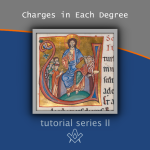 The ‘Old Charges’ have come down to us, containing the rules and regulations by which Lodges should be run and the moral and social standards to which each Lodge member should adhere. |
 Steps to the Making of a Master. The symbolism of each step of the winding staircase is to continue your personal development throughout your life, right up to your last breath in this world. |
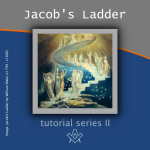 On the First Degree tracing board the most dominant feature is Jacob’s Ladder stretching from Earth to Heaven. Being straight, it is the shortest and quickest way to reach heaven, and being straight you can see the end goal. |
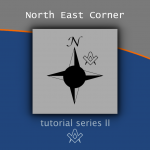 The North East Corner: A Lesson on Charity The ritual of the North East corner is a powerful piece of teaching. Let us examine that piece of ritual more closely; the lesson on charity. |
 When we look at the ritual book the deacons are told to ‘perambulate’ with the candidate. So what does this really mean? |
 The taking of a ‘Vow of Fidelity’. Oaths, Vows and Covenants |
 Morality veiled in allegory and illustrated by symbols A phrase that immediately comes to mind when describing Freemasonry – Morality veiled in allegory and illustrated by symbols. Let us have a look at what this phrase actually means. |
 Officers of the Royal Arch - The Principals The Principals' role in the Royal Arch, representing the pinnacle of spiritual leadership. Their esoteric significance lies in the unity of the three aspects of the divine, emphasizing the importance of harmony and balance in attaining spiritual enlightenment. The Principals embody the ultimate goal of the Royal Arch journey - the realization of divine wisdom. |
 Officers of the Royal Arch - Scribe Ezra Scribe Ezra is portrayed as a crucial figure within the Royal Arch, responsible for interpreting and teaching divine laws. The significance of his role lies in the pursuit of understanding and applying sacred knowledge, emphasizing the transformative power of wisdom when applied to one's life. |
 Officers of the Royal Arch - Scribe Nehemiah Scribe Nehemiah's responsibility within the Royal Arch, is that of preserving the sacred teachings. Scribe Nehemiah symbolizes the importance of maintaining accurate records and upholding the integrity of divine knowledge, thus reflecting the value of safeguarding spiritual wisdom for future generations. |
 Officers of the Royal Arch - The Sojourners The Sojourners, are seekers of truth, their journey symbolizes the spiritual path to enlightenment. Their role in rediscovering lost wisdom highlights the esoteric concept of regaining divine knowledge through perseverance and self-discovery. |
 Commentary on the Charge after Initiation A more detailed explanation in order for us to understand the Charge after Initiation |
 Officers of the Royal Arch - The Janitor The Janitor, is a crucial officer in the Royal Arch. Symbolically, the Janitor represents the guardian of sacred knowledge, ensuring only worthy individuals gain access. This function emphasizes the importance of maintaining spiritual purity and safeguarding the mysteries of the Royal Arch. |
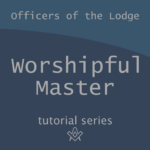 Officers of the Lodge - Worshipful Master Worshipful Master: the highest-ranking officer in the lodge, is the embodiment of wisdom and authority. The Worshipful Master guides the brethren on their spiritual path, representing the divine light that illuminates the Masonic quest for knowledge and self-discovery. |
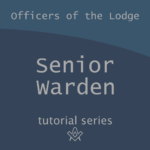 Officers of the Lodge - Senior Warden Senior Warden: embodies the essence of strength and stability within the lodge. As the pillar of support for the Worshipful Master, the Senior Warden symbolizes the fortitude required on our spiritual journey, inspiring us to persevere in the face of adversity |
 Officers of the Lodge - Junior Warden Junior Warden: Ensuring the well-being of the brethren during the lodge's hours of refreshment. Representing the virtue of temperance, the Junior Warden reminds us to find balance in our lives and cultivate moral discipline in our pursuit of truth. |
 Officers of the Lodge - Deacons Deacons: The messengers and intermediaries within the lodge. Representing the communication between the material and the spiritual realms, Deacons symbolize the importance of transmitting knowledge and wisdom as we strive for personal growth and enlightenment on our Masonic journey. |
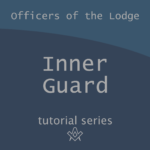 Officers of the Lodge - Inner Guard Inner Guard: Is the first line of defence against unworthy intruders, the Inner Guard represents our inner conscience and the personal responsibility we have to safeguard the integrity of our spiritual journey. |
 Tyler: The significance as the protector of the lodge's secrets and harmony. Tasked with guarding the entrance, the Tyler symbolizes our spiritual and moral boundaries, ensuring only worthy candidates are allowed into the sacred space of Freemasonry's teachings and rituals. |
masonic knowledge
to be a better citizen of the world
share the square with two brothers

click image to open email app on mobile device



